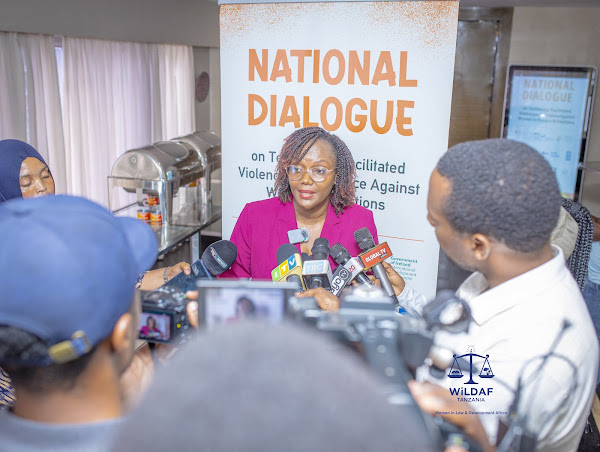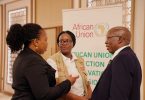The Women in Law and Development in Africa (WiLDAF
Tanzania), in collaboration with the government and development partners,
organized a National Dialogue to discuss the challenges of
technology-facilitated violence and other forms of violence against women in
politics and elections.
The dialogue, held on October 3, 2025, in Dar es Salaam,
brought together representatives from the government, UN agencies, women’s
rights activists, lawyers, the media, and civil society organizations.
Participants explored strategies to protect women’s safety in political spaces,
particularly as the country heads toward the 2025 General Election.
Opening the dialogue, WiLDAF Tanzania’s Executive Director,
Advocate Anna Kulaya, emphasized that technology-driven violence is a new
threat to democracy, especially when it targets women leaders, candidates, and
political activists.
“Ending violence against women in politics and elections
is not just a women’s issue it’s about strengthening democracy and protecting
the dignity of every citizen,” said Ms. Kulaya.
She added that the dialogue forms part of the preparations
for the 16 Days of Activism Against Gender-Based Violence campaign,
whose theme this year is “Protect the Community, End Digital and
Gender-Based Violence.”
Ms. Kulaya expressed gratitude to development partners who
supported the event, including UN Women, GIZ, UNDP, UNFPA, and the Embassies of
Ireland, Switzerland, and Belgium, for their continued collaboration with
WiLDAF in advancing women’s rights.
Speaking on behalf of the government, a representative from
the Ministry of Constitution and Legal Affairs acknowledged that while
technological advancement has increased transparency and access to information,
it has also created new challenges particularly digital violence against women.
“Acts such as hate speech, misinformation, and online
harassment damage women’s dignity and undermine the principles of equality,”
the official stated.
The representative further noted that in 2024, the
government enacted three key laws, including the Election Act, which under
Section 135 prohibits gender-based violence and harassment against female
candidates.
“We want women to participate in politics without fear.
We want peaceful, equal, and respectful elections,” they added.
During the discussion, Sisty L. Nyahoza, Assistant
Registrar of Political Parties, stressed the importance of political parties
taking a leading role by ensuring their constitutions and policies oppose all
forms of gender-based violence.
“Last year (2024), the Political Parties Act was amended by
the Parliament of the United Republic of Tanzania, requiring every political
party to have a gender policy and a gender desk to address gender-based
violence within political parties and the political arena,” said Nyahoza.
He also cautioned that online humiliation discourages many
women with political ambitions.
“People post insulting messages, images, and comments on
social media to intimidate women and stop them from engaging in politics. This
must be collectively condemned and fought against,” he added.
The dialogue carried a strong message advocating for the
protection of women’s rights and their safe participation in politics,
emphasizing that when women’s voices are silenced, democracy suffers.
“By protecting the dignity of today’s women leaders, we
safeguard the democracy of tomorrow,” WiLDAF’s message emphasized.
This National Dialogue marks a new chapter in Tanzania’s
national conversation ahead of the 2025 General Election aimed at building a
unified strategy to combat digital and gender-based violence and promote a peaceful,
inclusive, and equitable electoral environment for all.

































